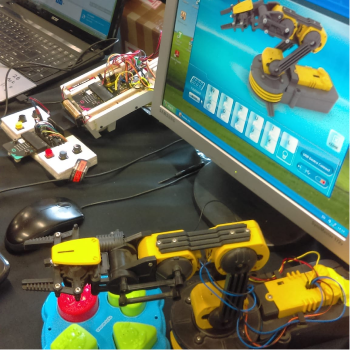Community spotlight highlight
BCS Coventry branch - Robot Day 2024
On the day (16 March 2024), with 4 different robots in tow, the team was able to showcase BCS’ ICDL Level 1 Robotics Award, which is a new qualification in conjunction with the ICDL Foundation; covering the basic concepts and skills required to understand, build and programme robots. It is intended for pupils who are in the early years of building up to their GCSEs (i.e. not to put pressure on them in the years they are taking their GCSEs), giving them an early qualification in robotics which will stay with them throughout their career.

Volunteer awards and recognition
BCS depends on the good services of its volunteer force of members for many of its activities, enabling it to meet its charter and its charitable objects. BCS recognises its volunteers for their hard work, dedication and achievement on behalf of BCS, through its volunteer awards.
Find out more, including how to nominate
Certificate of Appreciation
For significant involvements, achievements or benefits to BCS as a direct result of the volunteer’s personal contribution in a single voluntary role, that goes beyond the normal expectations of their role.
2025
- Patrick Burgess
2024
- Siobhan Tracey
2023
- Jon Hall
- Gill Ringland
- Philip Crewe
- Mike Harris
- Colin Broad
- Richard Henson
- Simon Wallace
2022
- Ashish Bhatt
- Charles Ryder
- Glen Vaal
- David Grundy
- Patrick Roberts
- Margaret Low
- John Rendall
- Gareth Niblett
- Alan Woodroffe
- Tim Denvir
- Charlotte Hughes
- David Binns
- Martin Beer
- Adam Leon Smith
- Shahrzad Zargari
- Julian Schwarzenbach
- Mike Buckland
- Phil Hopkins
2021
- Terry Bounds
- Khalid Husnoo
Meritorious Service
For tangible involvements, achievements or benefits to BCS as a direct result of the volunteer’s personal contributions to two or more voluntary roles in different areas of BCS’s work, that goes beyond the normal expectations of their role.
2023
- Jeff Naylor
- Shakeeb Niazi
2022
- Irene Glendinning
- Jim McLean
- Charlie Houston-Brown
2020
- Adel Al Hashmi
John Ivinson Award
For significant achievements and benefits to BCS as a direct result of the volunteer’s contributions on a wide scope of BCS’s areas of endeavour, significantly furthering BCS’s strategic aims and mission. Typically this prestigious award would be presented to 1-3 volunteers per year.
2023
- Kevin Chalmers
- Mike Hurst
- Rob Neil
2022
- David Murie
- Dalim Basu
2021
- Rick Chandler
- Carol Long
Pre-2021
- John Mitchell - 2017
- Geoff Staples - 2012
- Andrews McGettrick - 2012
- Margaret Ross - 2011
- Ralph Miller - 2011
- Graham Brookes - 2010
- Susan Black - 2009
Community Board is responsible for awarding Honorary Fellowship to individuals who have made an outstanding contribution to the charitable objects of the BCS over an extended period of time.
Roll of Honorary Fellows
The long service awards intend to recognise and reward length of service of a volunteer irrespective of the nature of that voluntary service, and the were designed to sit alongside the ‘Recognition of Appreciation’ awards.










